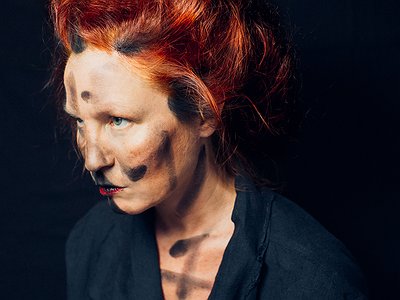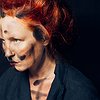Part 1
Name: Sonae
Nationality: German
Occupation: Sound Artist, Producer
Current Release: I Started Wearing Black and I Started Wearing Black Remixes on Monika Enterprise
Recommendations: The book "The Vegetarian" by Han Kang recently impressed me a lot for its radical, consequent narrative and unreliable, abstract form. I could not imagine a better way to speak out what Han Kang transmitted in this book.
Website / Contact: If you enjoyed this interview with Sonae, visit her website and facebook page.
When did you start writing/producing music - and what or who were your early passions and influences? What what is about music and/or sound that drew you to it?
When I was a teenager (1990s) I discovered DJing. I'm from a small village, I didn't like what the girls did, which is why I was more hanging with boys - and skateboarding and DJing was around. I never really made it into pop music, as a ballet dancer and grandchild of a piano teacher I felt closer to classical music. Electronic music was a thankful alternative. So it was my personal setting that paved my way for DJing and later (2011) producing electronic music.
For most artists, originality is first preceded by a phase of learning and, often, emulating others. What was this like for you? How would you describe your own development as an artist and the transition towards your own voice? What is the the relationship between copying, learning and your own creativity?
Exploring the fields of electronic music, learning about styles, their parameters, their contextualisation in the scene - I learnt all this as a DJ. So it wasn't difficult for me to dive into the process of developing my own language as a producer. Also because I wasn't that young anymore, about 30 years old - a good age for artistic work: you have gathered enough experiences in life, you've been partying and participating in the scene enough. It's a good starting point for reflection, adaption, transformation. It is also a good reason for intense learning. After debuting with my first album "Far away is right aroung the Corner" (Monika Enterprise, 2015) I went back to university and did a Master at the Institute for Popular Music of Folkwang University of Arts. It was important for me to have these years to reflect about my status quo after the debut and to define the direction I wanted to take for my second album.
Of course, I always have a curious ear and eye on artists and releases. But I am not so much a copying person. Rather, I am a sponge when it comes to learning about the technical side and I never get tired of attending workshops, summer classes or bothering my teachers with "emails by an alumni".
What were your main compositional- and production-challenges in the beginning and how have they changed over time?
For sure the technical side of production has been the most demanding part for me because I seriously did not have a clue. But I was lucky. Right after I'd decided to work with Ableton live, I found a note that there would be a remix workshop in my town teaching the use of that software to beginners. I attended remix:regendered in Winter 2011 and learned production basics within a week. I got heavily infected with the production virus just like I did before with DJing - since then I haven´t stopped making my own music.
What was your first studio like? How and for what reasons has your set-up evolved over the years and what are currently some of the most important pieces of gear for you?
For the remix workshop I borrowed an old laptop from my brother with an extremely loud air vent because I only had a 1GB RAM tower PC at home. All my tracks produced before 2013, including my debut album, were realised on that tower PC - I had to freeze all stems and unfreeze them for every single change. Then freeze them back to listen to the piece. A meditative work!
Even today I only buy what I really need to realise my ideas. I do not use a lot of plugins. Of course now I have a laptop for live performances but it's been the same for 5 years now. The most important thing for me was to get me a fieldrecorder to record small instruments, the sound of things or my piano at home. It was important for me to build up a huge selection of my own sounds, beginning with a recording, later processing these recordings. This means 99% of my sounds are really self-made. Only recently, I started using on board instruments. I had to manifest my musical vocabulary first.
When it comes to gear I like boutique budget tools. I love the Korg mini series, the Akai mini controllers, or the good old Korg nano control. I don't believe in expensive gear and I don't need a huge studio. I believe in musicality, in good taste and educated ears.
How do you make use of technology? In terms of the feedback mechanism between technology and creativity, what do humans excel at, what do machines excel at?
Technical possibilities can be totally inspiring! As a vinyl DJ I feel very inspired by the additional options through digital DJing. But at the same time, I see a very poor form of DJing today - mostly performed by DJs who obviously never learnt how to DJ with vinyl. Equipment is inspiring, new machines, new sounds, new tools. At the same time, I see many producers owning a lot of gear but delivering totally random and not interesting results. It all has it good and it bad sides. It is up to us to decide.
I love learning and I constantly develop my work. I do it in a slow but intense way, so I can truly understand what I am doing. I focus on ideas more than I focus on new tech.
Production tools, from instruments to complex software environments, contribute to the compositional process. How does this manifest itself in your work? Can you describe the co-authorship between yourself and your tools?
Ah, this question is exactly referring to what I tried to speak about in my previous answer. And as you may have guessed by now, I consider me the only author of my work. I do not dedicate my work to the typical sound of a certain machine, and my set-up is so very much my instrument that it will never take over control. It is me riding the bike, not the other way around. Though there are magical things happening again and again when I am in the studio, the result of an unexplainable chain of things ... but I would not consider it as co-authorship of machines, rather as witchcraft.
Collaborations can take on many forms. What role do they play in your approach and what are your preferred ways of engaging with other creatives through, for example, file sharing, jamming or just talking about ideas?
To be honest, I am very much a solo worker. I am part of Monika Werkstatt which is the recording and live performing collective of label Monika Enterprise. We are touring together and we released an album together. I even did a side collaboration with Danielle de Picciotto, we released an album together. And AGF and Natalie TBA Beridze did the same. So our label collective is super fruitful. But we are super aware that we are not a band or something, we all are solo artists. And this is how it works for me - I do collaborate, but what is happening there does not really affect my solo work.
But you mentioned "talking about ideas" as a form of collaboration. Well, for me talking about ideas is happening in friendships.






